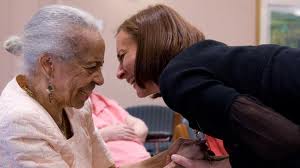“I hope someone shoves me off a balcony.”
“I’ll drive off a cliff first, before that happens to me.”
“There’s no point in going to visit; she doesn’t even know who I am anymore.”
“The lights are on but nobody’s home.”
Over the years, I’ve heard these comments and hundreds of variations along the same lines. The meaning behind the comments seems to be, People with dementia could not possibly have any quality of life. It also sometimes (a lot) sounds like, I don’t know how to relate anymore.
The notion that people with dementia can’t enjoy any quality of life is just plain wrong. They absolutely have the capacity to experience joy. Because there is very real and tangible loss that goes with dementia, and we feel so much grief and helplessness watching the disease progress, we often get stuck focusing on the loss. But if we allow ourselves to look past the loss and grief, we can discover opportunities to experience the moments of joy.
During disease progression, the intellect recedes but the emotional and spiritual core of a person with dementia becomes more prominent. When we embrace that fact, the upside is that we are able to relate in entirely different ways. Roger has Alzheimer’s disease. He and his adult son, Thomas, had a magical holiday together because Thomas was aware of the shift from intellect to emotion and tapped into it.
Thomas told me that Roger said profound, emotional things to Thomas that he never thought he’d hear, because it was so out of his dad’s character prior to Alzheimer’s disease to be emotionally open. But because Thomas was able to let go of focusing on what’s been lost and instead be in the here and now, he received a priceless gift from Roger.
When I hear people say there’s no point in visiting because Mom/Dad/Grandma/Grandpa no longer knows a specific name, I want let loose my inner Dr. Phil and holler, “This isn’t about you!” People may not understand what you say and they may not know your name, but they always understand how you make them feel. They feel love right up to their very last breath.
So while it may be true your name is long gone from their memory, people with dementia still respond on the visceral level of, “Hey, there’s that guy I like!” whether they’re able to verbalize it or not.On an interesting side note, in all the hundreds of people I’ve worked with, I’ve never known a spouse to stop visiting because he or she wasn’t recognized by name or relationship anymore.
When I worked in memory care, I loved to have pictures of people when they were younger posted outside their rooms. Not only did it help people figure out where their room was, it also helped anyone walking by to remember there’s still a person in there, one who used to be young and vibrant…just like you.
Christy Turner is the founder of CTC Dementia Care Management, creator of the program What To Do When Your Loved One Has Dementia, and has enjoyed the privilege of working with over 900 people living with dementia and their families. Learn more about her here, more about CTC’s services here, or check out upcoming events here.

